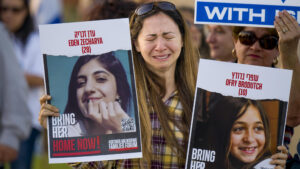In the weeks since Israel launched its offensive against Hamas, one doctor’s reports from Gaza’s hospitals have proved more valuable to the media than any other: those delivered by Dr Ghassan Abu-Sittah, a British-Palestinian surgeon. Indeed, when Abu-Sittah held a press conference in London this week after a 43-day stint in Gaza, almost every leading outlet turned up.
Israel, he told them, was deliberately targeting children with banned weapons: “The primary target of the bombing was people’s residential homes,” he claimed at one point, the footage of which was later uploaded to The Guardian’s website. “And we started seeing phosphorus burns. By day four or five, half of my operating list, which was around 10 to 12 cases every day… were children. At one night in al-Ahli hospital, I performed amputations on six children.”
Describing him as “softly-spoken”, a Sky News correspondent repeated his claim that a rocket which hit the al-Ahli was not fired by Palestinian terrorists, despite compelling evidence to the contrary. “There was no smell of fuel,” Abu-Sittah was quoted as saying. “You’d think that a missile that was destined for Tel Aviv would be full of fuel.” The channel also repeated the doctor’s insistence that al-Shifa — another of the hospitals where he worked — was not a Hamas command centre, a claim which contradicts recent Israeli findings. “At no stage did I see any [Hamas terrorists] — at no stage did I see even armed policemen — at Shifa hospital.”
The BBC, meanwhile, conducted its own interview with Abu-Sittah after the press conference, in which he outlined the “overwhelming sense of guilt” he felt towards “the patients that still need my help”. The exclusive interview came days after one of the broadcaster’s reporters — Sanaa Khouri, a Beirut-based religious affairs correspondent — tweeted of him: “One might say, ‘Give this hero a Nobel Prize,’ but nah, his name is much bigger and more iconic than any prize now. God bless you, Dr Ghassan. Thanks for showing us there is still good out in this monstrous world.”
Elsewhere, The Telegraph’s report highlighted that, “throughout his time in Gaza, Prof Abu-Sittah provided regular updates to The Telegraph”, and described how he performed “six amputations in one night”. An interview with the Daily Mail a week after Hamas’s attack detailed how he “has been operating night and day ever since” his arrival on 9 October.
Amid the fog of war, such first-hand accounts are rare — and for good reason: they are extremely hard to verify. And on this front, it seems much of the UK media has not told the entirety of Dr Abu-Sittah’s story.
Abu-Sittah, according to his website, specialises in treatments such as facelifts and chin augmentation. He works out of two clinics in Britain and describes himself as a “Consultant Reconstructive & Aesthetic Plastic Surgeon”. He is not, however, on the “specialist register”, according to the General Medical Council (GMC).
Nor does Abu-Sittah seem to be the impartial observer portrayed by many in the media. His social media is filled with messages which appeared to be broadly supportive of Hamas’s attack on Israel. The day after October 7, as he was already making his way to Gaza via Egypt, he retweeted a number of posts sympathetic to the terror group. “For the native, objectivity is always directed against him,” said one. Another read: “We know Israel is going to kill us anyways. We are starving, we are being besieged, we are being dispossessed, we are being displaced. We know all of this. Israel is going to kill us anyways. Israel wants us kneeling… So why not fight back and die in dignity?” In the following weeks, he has retweeted a post comparing Prime Minister Benjamin Netanyahu to Hitler and another which described Israel as “a child killer regime”.
And this was far from the first time he has expressed such views. Three years ago, he wept as he eulogised Maher Al-Yamani, a founder of the Popular Front for the Liberation of Palestine, which is designated a terrorist organisation in the US and EU, but not the UK. “This is our only comfort: that even when Maher leaves, the Israelis will be afraid of Maher,” Abu-Sittah told a ceremony in Beirut commemorating the first anniversary of his death.
It’s safe to say that none of this appeared in the majority of recent news reports about his experience in Gaza. Nor, for that matter, has his family history.
While Ghassan Abu-Sittah was born in Kuwait in 1969, his father, Salman, grew up in Be’er-Sheva, an Israeli city in what was then Mandatory Palestine. During the Arab-Israeli war of 1948, his family left their home and became refugees in the Gaza Strip, before moving to Egypt where he graduated from Cairo University and eventually moved to the UK.
Since then, Salman has dedicated much of his life to pushing for the controversial “right of return” of Palestinians to the land which is now Israel. He has called Israelis “ghetto-dwellers in Europe who came to take our land”, described the founding of the state of Israel as “exactly like Nazi Germany occupying France”, and claimed the country had “set up detention and forced labour camps for the Palestinians”. His comparison of Israel to Nazis did not prevent him from being invited to lecture at the University of Edinburgh to mark the centenary of the British Mandate in Palestine.
None of this is to say that Ghassan has no medical training. He was educated at the New English School in Kuwait and then studied medicine at the University of Glasgow. According to his LinkedIn page, he has undertaken a number of fellowships at leading hospitals, including Great Ormond Street and the Royal London Hospital. In 2011, he took up a job as a craniofacial, plastic and reconstructive surgeon at the American University of Beirut Medical Center in Lebanon. During that time, according to his own websites, he continued to work as “a war surgeon in conflict zones including Iraq, South Lebanon and Gaza”. While the university did not respond to a request for comment, in 2020, he seems to have returned to the UK, where he re-registered back with the GMC after a nine-year hiatus and opened up his cosmetic surgery practice.
Today, his biography on his website states that he is an “honorary senior clinical lecturer at the Centre for Blast Injury Studies at Imperial College”. It also claims that “he serves on the board of directors of INARA, a charity dedicated to providing reconstructive surgery to war injured children in the Middle East”. INARA, however, is not registered as a charity. It is a limited company whose accounts are so overdue that it was issued with a notice for compulsory strike off by Companies House on 28 November. Although he does have a previous association with the charity Medical Aid for Palestinians, his directorship was terminated on 18 October.
Like his father, Dr Abu-Sittah’s interest in Gaza and Israel is long-held. As far back as 2003, a documentary — A Palestinian’s Return To Gaza — was made about his work in Gazan hospitals. In it, he described how he had first visited the strip as part of a UN-sponsored medical programme, taking “six months leave from my job as a surgeon in the UK”. “When I operated on patients in Gaza, I was filled with an overwhelming sense that these bodies were violated for political ends by something that was inhuman and was designed to dehumanise their bodies,” he said. Six years later, in a blog post co-written for the since-closed Lancet Global Health, he claimed that Israel was testing “new particle weapons” in Gaza. The blog was later taken down because of unspecified factual inaccuracies.
It was on 18 October — the day after a rocket landed in the car park of the al-Ahli hospital — that Dr Abu-Sittah, who had travelled to Gaza with Medecins Sans Frontières, officially captured the Western media’s attention. With Hamas claiming it was the result of an Israeli attack which had killed 500, he appeared at the centre of a press conference on the hospital site surrounded by rubble and body bags. “We were performing surgery at the Baptist hospital when a strong explosion occurred and the ceiling fell on the operating room,” he said. “This is a massacre.” Even today, with Western governments and Human Rights Watch claiming it was most likely caused by a misfired rocket inside Gaza hitting the hospital’s car park, rather than the building itself, he still insists it was an Israeli attack.
While in Gaza, he also reported that counter-terrorist police officers had visited his family at his home in London. He later told BBC Newsnight that his wife had been questioned about why he had travelled to the Palestinian territory and who paid for his ticket. “I think it’s a brutal attempt at harassment and silencing us,” he said. When asked yesterday whether that investigation was closed, the Metropolitan Police stated that it does not comment on queries relating to named individuals and whether they may, or may not, form part of any counter terrorism investigation.
At around the same time that UnHerd started making enquiries of Abu-Sittah, an in-conversation event with him at The Palestine Festival of Literature in London, scheduled for Wednesday, was cancelled. “Due to emergency circumstances Dr Ghassan Abu Sitta [sic] is no longer able to do tomorrow night’s event in London,” its organisers said.
Last night, a statement from his lawyers said: “Professor Abu-Sittah’s lawyers declined to comment in detail, save to say that any allegations of dishonesty, misrepresenting his expertise or supporting terrorism are totally false and defamatory.”
Disclaimer
Some of the posts we share are controversial and we do not necessarily agree with them in the whole extend. Sometimes we agree with the content or part of it but we do not agree with the narration or language. Nevertheless we find them somehow interesting, valuable and/or informative or we share them, because we strongly believe in freedom of speech, free press and journalism. We strongly encourage you to have a critical approach to all the content, do your own research and analysis to build your own opinion.
We would be glad to have your feedback.
Source: UnHerd Read the original article here: https://unherd.com/




